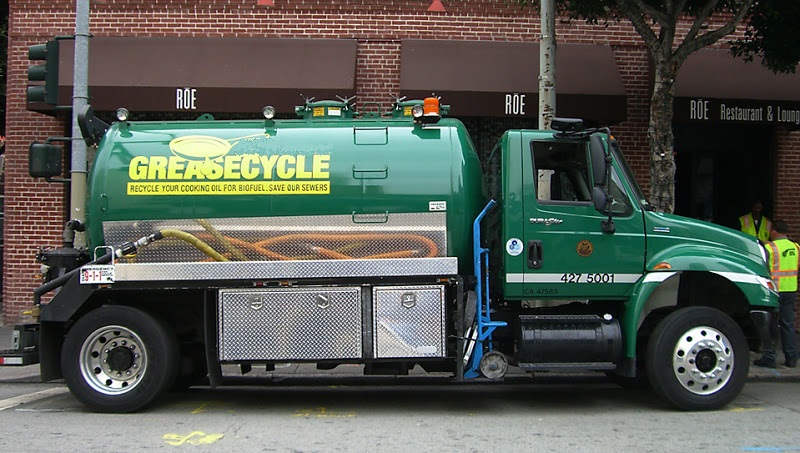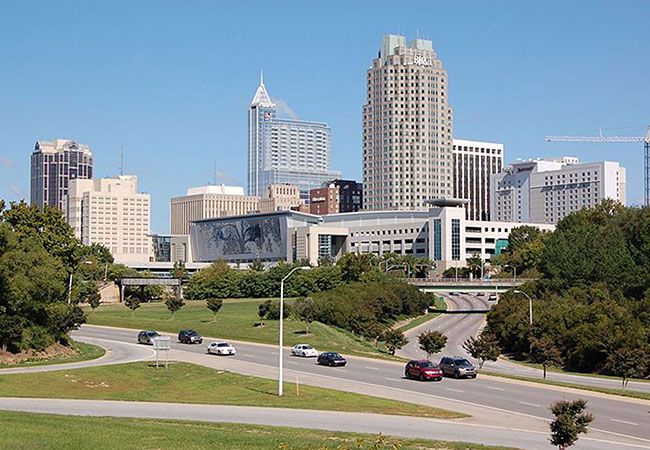Stay Compliant. Prevent Odors and Backups.
Greasecycle® is a local grease trap cleaning company based right here in Raleigh, NC. Greasecycle® services kitchens in the surrounding cities of Durham, Cary, Apex, Garner, Chapel Hill, and Wilmington, and the entire Triangle area.
Grease traps are important systems in a commercial property. Greasecycle® will schedule regular cleaning and checking of your grease interceptors that are unique to your company's specific needs. We will help you to avoid unpleasant drain backups and spills.
Whether you own a restaurant, school, nursing home, or industrial facility Greasecycle®'s professionally trained technicians will pump out your grease trap and deliver it to their 'state of the art recycling facility'. At the recycling facility the mixture of grease, water, and food particles will be processed into compost and biofuel.
Learn more about our services, then give us a call to schedule your grease pumping today.
Contact Us To Learn More
Greasecycle®: Professional Grease Pumping in Raleigh
Our highly trained technicians frequently service Raleigh area restaurants and commercial food establishments enabling them to meet their grease trap needs. Greasecycle® is a Green-Company that focuses on recycling spent grease into renewable biofuel.
Greasecycle® is 100% certified to remove your used cooking oil from your facility AND permitted by the North Carolina Department of Environmental Quality (NCDEQ)
Warning Signs Your Grease Trap Needs to Be Cleaned
If your grease traps or grease interceptors are exhibiting any of the following signs, definitely contact us for cleaning!
- Foul Odor - if you're experiencing a foul odor in your kitchen DO NOT WAIT to give us a call. This is the biggest sign that your grease trap might overflow.
- Slow Drainage - If the water in your sink is slow to drain or completely blocked there is a good change your grease interceptor needs to be cleaned.
- Low Water Level - A full grease interceptor can cause water levels in your toilets to be low.
How Often Should Your Grease Trap Be Cleaned?
According to the regulations of the city of Durham, all grease removal systems need to be cleaned on a monthly schedule. A more frequent cleaning schedule is required if a user’s discharge contains more than 250 mg/L of fat, oil, or grease. A less frequent cleaning can be arranged if it can be demonstrated to the City that the 250 mg/L limit can be met with the proposed cleaning schedule.
The professionals at Greasecycle® will prepare a service frequency schedule to suit your kitchen's specific needs, thereby helping you to prevent drain backups and overflows. With our automatic grease trap pumping service, you can 'set it and forget it'.

Service Pricing
Our pricing varies according to the size, accessibility, and frequency of our visits. Our rate per visit is generally reduced when visits to your establishment are more frequent. For the most accurate quote please provide us with the location of your grease trap, and its size.
Standard sizes of indoor grease interceptors are; 30 gallons or 60 gallons
Standard sizes of outdoor grease interceptors are; 1000 gallons or 1500 gallons
Contact Us To Learn More
The Greasecycle® Pledge!
- We remove all grease and food solids
- We aim to service your establishment at times of the day that minimize any interruption of your business
- We help your business stay in compliance with current regulations by documenting proper manifest paper work.
- We maintain complete records of our service to your grease traps
- Much of the material we remove is repurposed - used in anaerobic digestion to increase methane for electricity generation or as a soil amendment used for non-edible agriculture
- Material that we cannot repurpose is safely disposed of at licensed facilities according to local regulations
Proudly Servicing the Following Areas:
Proudly providing grease trap cleaning services in Dumfries, Falls Church, Tricities, Fairfax, Ashland, Raleigh, Chesterfield, Durham, Cary, Chapel Hill, Greensboro, High Point, Winston Salem, Charlotte, Greenville, Spartanburg, Columbia, Richmond, Hampton Roads, Virginia Beach, Henrico County, Newport News, Mechanicsville, Portsmouth, Arlington, Centreville, Alexandria, Norfolk, Fredericksburg, Annandale, Midlothian, Glen Allen, Williamsburg, Sandston and Chesapeake.

Raleigh Area Information
Raleigh is the capital of the state of North Carolina and the seat of Wake County in the United States. Raleigh is known as the "City of Oaks" for its many oak trees, which line the streets in the heart of the city. The city covers a land area of 142.8 square miles (370 km2). The U.S. Census Bureau estimated the city's population as 451,066 as of July 1, 2015. It is one of the fastest-growing cities in the country. The city of Raleigh is named after Sir Walter Raleigh, who established the lost Roanoke Colony in present-day Dare County.
Raleigh is home to North Carolina State University and is part of the Research Triangle area, together with Durham (home of Duke University) and Chapel Hill (home of the University of North Carolina at Chapel Hill). The "Triangle" nickname originated after the 1959 creation of the Research Triangle Park, located in Durham and Wake counties, among the three cities and their universities. The Research Triangle region encompasses the U.S. Census Bureau's Raleigh-Durham-Chapel Hill Combined Statistical Area (CSA), which had an estimated population of 2,037,430 in 2013. The Raleigh Metropolitan Statistical Area (MSA) had an estimated population of 1,214,516 in 2013.
Most of Raleigh is located within Wake County, with a very small portion extending into Durham County. The towns of Cary, Morrisville, Garner, Clayton, Wake Forest, Apex, Holly Springs, Fuquay-Varina, Knightdale, Wendell, Zebulon, and Rolesville are some of Raleigh's primary nearby suburbs and satellite towns.
Following the establishment of the Research Triangle Park in 1959, numerous jobs were created in science and technology. The region and city have attracted a large influx of population, making it one of the fastest growing communities in the United States by the early 21st century.
Source: Wikipedia